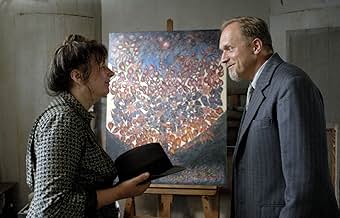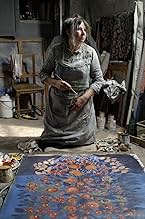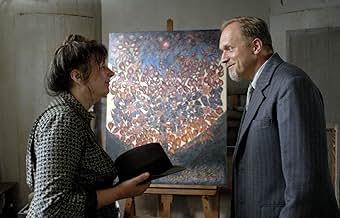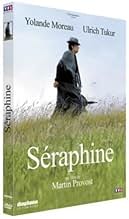CALIFICACIÓN DE IMDb
7.4/10
6.7 k
TU CALIFICACIÓN
Basada en la vida de la pintora francesa, Séraphine de Senlis.Basada en la vida de la pintora francesa, Séraphine de Senlis.Basada en la vida de la pintora francesa, Séraphine de Senlis.
- Dirección
- Guionistas
- Elenco
- Premios
- 20 premios ganados y 10 nominaciones en total
Léna Breban
- Soeur Marguerite
- (as Léna Bréban)
Sandrine Bodenes
- Marie-Louise
- (as Sandrine Bodènés)
Anne Benoît
- Madame Delonge
- (as Anne Benoit)
- Dirección
- Guionistas
- Todo el elenco y el equipo
- Producción, taquilla y más en IMDbPro
Opiniones destacadas
A frumpy cleaning woman well into middle age is discovered by an art critic to be a painter with talent comparable to Vincent Van Gogh. Her story is told in the riveting Seraphine, directed by Martin Provost and winner of seven Césars, the French version of the Oscars, including a best actress award for Yolande Moreau. With a screenplay by Martin Provost and Marc Abdelnour, the film is set in the village of Senlis outside of Paris where Séraphine Louis (Yolande Moreau) lives alone and must take odd jobs just to pay for her painting supplies. Séraphine is a visionary, a devout Catholic who believes she is guided by a guardian angel and her exotic paintings of flowers and plants describe her feelings of closeness to spirit.
Treated with disdain by her condescending employer, her life takes on new meaning when a tenant, German art critic Wilhelm Uhde (Ulrich Tukur) hires Séraphine to clean for him and accidentally discovers one of her paintings that her boss had tossed aside. A champion of modern "primitvist" artists who is credited with early recognition of Picasso and Rousseau, Uhde is portrayed by Tukur as a quiet, unassuming man who lives with his sister and a gay lover. He recognizes Séraphine's talent but never shows much enthusiasm, preferring to keep their relationship on a very business-like basis.
Impressed by Seraphine's passionate art, Uhde offers to become her patron but, feeling estranged in France, must soon leave the country to return to Germany as the First World War begins. Although Séraphine continues to paint, she has no connection with Uhde until the latter part of the 1920s when he provides her with the means to quit her job and paint full time. Unfortunately, her grip on reality falters and she is soon hospitalized after indulging in spending sprees on a wedding dress and purchase of a large mansion. One of the saddest scenes in the film is that of Séraphine dressed in a full wedding gown, going door to door giving her away her possessions.
Provost in Séraphine captures the artist's mystical nature and her close bond with nature that shows up in her works, which are still exhibited in many of the world's museums. She is shown hugging trees, climbing them, and standing as a tiny speck beneath a towering shade tree. One scene shows her standing nude in water up to her chest in a nearby river. Provost takes a minimalist approach and the film does not contain much dialogue. The story is told by the silences and facial expressions and the music by Michael Galasso adds richness to the experience. Fully capturing the eternal mystery of the creative process, Séraphine itself is a work of art.
Treated with disdain by her condescending employer, her life takes on new meaning when a tenant, German art critic Wilhelm Uhde (Ulrich Tukur) hires Séraphine to clean for him and accidentally discovers one of her paintings that her boss had tossed aside. A champion of modern "primitvist" artists who is credited with early recognition of Picasso and Rousseau, Uhde is portrayed by Tukur as a quiet, unassuming man who lives with his sister and a gay lover. He recognizes Séraphine's talent but never shows much enthusiasm, preferring to keep their relationship on a very business-like basis.
Impressed by Seraphine's passionate art, Uhde offers to become her patron but, feeling estranged in France, must soon leave the country to return to Germany as the First World War begins. Although Séraphine continues to paint, she has no connection with Uhde until the latter part of the 1920s when he provides her with the means to quit her job and paint full time. Unfortunately, her grip on reality falters and she is soon hospitalized after indulging in spending sprees on a wedding dress and purchase of a large mansion. One of the saddest scenes in the film is that of Séraphine dressed in a full wedding gown, going door to door giving her away her possessions.
Provost in Séraphine captures the artist's mystical nature and her close bond with nature that shows up in her works, which are still exhibited in many of the world's museums. She is shown hugging trees, climbing them, and standing as a tiny speck beneath a towering shade tree. One scene shows her standing nude in water up to her chest in a nearby river. Provost takes a minimalist approach and the film does not contain much dialogue. The story is told by the silences and facial expressions and the music by Michael Galasso adds richness to the experience. Fully capturing the eternal mystery of the creative process, Séraphine itself is a work of art.
Veteran actress Yolande Moreau gives a dedicated performance in this biopic about the neo-primitive, or "naive," or "outsider" flower painter Séraphine Louis (1864-1948), now called Séraphine de Senlis, from the town where she worked. An orphan looked down on by all, she survived barely by doing cleaning and laundry paid by the job, but in her little room in town at night by candlelight made strange, visionary paintings of flowers in large clusters, looking like diamonds or insects. Raised and cared for in early life by nuns, she sang to the Virgin when she finished a painting. Beautifully photographed, meditative, with a strong sense of the quietude of rural France in the teens and twenties, this picture doesn't provide deep insight into either Séraphine or the German art collector who discovered and supported her, Wilhelm Uhde (Ulrich Tukur, another veteran; he has one of the secondary leads in The Lives of Others). Uhde deserves his own biopic. He was the first to purchase the works of Picasso and discovered the great modern primitive Henri "Le Douanier" Rousseau.
Slowly, methodically, the film shows how Uhde finds out by chance that the haggard looking middle aged woman cleaning up in the big rented house he's living in in Senlis with his sister is doing unique paintings on wood. Nobody else around appreciates them or, in fact, understands modern art. He buys all her work from Séraphine and urges her to concentrate on her art. But WWI comes, and as a German he is forced to leave precipitously, leaving behind his little notebook and most of the art he's collected in France.
Uhde returns years later with his sister and also a male lover, Helmut Kolle (Nico Rogner), a talented young German expressionist painter dying of TB, and rents another house in the area. He comes across Séraphine's work and finds it more ambitious and much more brilliant. He puts her on a generous monthly stipend. She shows signs of mania, and her disappointment when she finds the Paris exhibition must be put off due to the worldwide financial crisis leads her into insanity. The trajectory is ever downward, though the final scenes suggest that her last years in a sanatorium may have been spend it serenity, close to the nature she loved.
This film is thorough and handsomely made, but a little too much on the dutiful and academic side. It has parallels as a story with Bruno Nuytten's 1988 Camille Claudel, but it has neither the level of drama nor the presence of Gérard Depardieu and Isabelle Adjani (as Rodin and Claudel) to give it energy. As director Provost has said, Uhde had a "dark side": his willingness to virtually abandon Séraphine when things got rough for her, and not to bother looking for her when he first returns to France after the War. Provost leaves this mysterious, which is just historically, but unsatisfying cinematically. But Provost did apparently help organize the recent Musée Maillol exhibition of Séraphine's work. And this film is a thought-provoking addition to the on-screen literature of outsider or visionary art.
The film opened in theaters in Paris on October 1, 2008 to respectful if not overly enthusiastic reviews. It has been bought by Music Box in the US, but no release has been announced. Shown as part of the Rendez-Vous with French Cinema at Lincoln Center, NYC, in March 2009.
Slowly, methodically, the film shows how Uhde finds out by chance that the haggard looking middle aged woman cleaning up in the big rented house he's living in in Senlis with his sister is doing unique paintings on wood. Nobody else around appreciates them or, in fact, understands modern art. He buys all her work from Séraphine and urges her to concentrate on her art. But WWI comes, and as a German he is forced to leave precipitously, leaving behind his little notebook and most of the art he's collected in France.
Uhde returns years later with his sister and also a male lover, Helmut Kolle (Nico Rogner), a talented young German expressionist painter dying of TB, and rents another house in the area. He comes across Séraphine's work and finds it more ambitious and much more brilliant. He puts her on a generous monthly stipend. She shows signs of mania, and her disappointment when she finds the Paris exhibition must be put off due to the worldwide financial crisis leads her into insanity. The trajectory is ever downward, though the final scenes suggest that her last years in a sanatorium may have been spend it serenity, close to the nature she loved.
This film is thorough and handsomely made, but a little too much on the dutiful and academic side. It has parallels as a story with Bruno Nuytten's 1988 Camille Claudel, but it has neither the level of drama nor the presence of Gérard Depardieu and Isabelle Adjani (as Rodin and Claudel) to give it energy. As director Provost has said, Uhde had a "dark side": his willingness to virtually abandon Séraphine when things got rough for her, and not to bother looking for her when he first returns to France after the War. Provost leaves this mysterious, which is just historically, but unsatisfying cinematically. But Provost did apparently help organize the recent Musée Maillol exhibition of Séraphine's work. And this film is a thought-provoking addition to the on-screen literature of outsider or visionary art.
The film opened in theaters in Paris on October 1, 2008 to respectful if not overly enthusiastic reviews. It has been bought by Music Box in the US, but no release has been announced. Shown as part of the Rendez-Vous with French Cinema at Lincoln Center, NYC, in March 2009.
Séraphine de Senlis - born Séraphine Louis (1864- 1942) - may not be a painter well known to the entire art world today, but the story of her life makes a compelling film. Writer Marc Abdelnour and writer/director Martin Provost have extracted all of the significant aspects of Séraphine Louis' life and have created a work of art as a film, much in the style of the way she created her life in art.
Séraphine Louis (Yolande Moreau) was born in 1864 in Arcy to a poor family and worked as a shepherdess until 1881 when she accepted the position as a domestic worker for the Sisters of Providence in Clermont: her life with the nuns enhanced her profoundly religious approach to her personal philosophy. In 1901 she left the convent, in part due to a communication with her angel that she must paint, to become a housekeeper for middle class families in Senlis. In her quiet manner she scrubbed floors and did laundry by day, using the pittances of income to procure some supplies so that she could paint her images of fruits, flowers, and leaves by candlelight at night in her tiny room. Self taught, she used pigment from strange sources - blood from the butcher, melted wax from the votives at the cathedral, pollen from the flowers of the fields, her only 'purchased' component was gesso and white paint from the artist supply shop in Senlis.
In 1914 the German art collector and critic Wilhelm Uhde (Ulrich Tukur) took a room in the house owned by Mme Duphot (Geneviève Mnich), one of the houses where Séraphine worked, and when Wilhelm discovered a painting by Séraphine he immediately recognized a painter of great promise and provided Séraphine with the first response to her artistic efforts. Wilhelm and Séraphine became friends and Wilhelm bought all of her art, insisting that she devote her time to creating art instead of scrubbing floors. With the backing of a collector and friend, Séraphine began painting in earnest, showing locally and selling art under Wilhelm's sponsorship, until 1914 when with WW I breaking out, Wilhelm had to flee France, leaving behind his collection of paintings as well as the close bond the two had formed. Mistakenly Séraphine thought Wilhelm's departure was to marry his roommate Anne-Marie (Anne Bennett), only to discover that Anne-Marie was Wilhelm's sister and fellow supporter of Séraphine: Wilhelm informed her he would never be able to marry a woman.
Séraphine continued painting as she lead her eccentric life in Senlis and in 1927 Wilhelm returned to France with his paramour - young painter Helmut Kolle (Nico Rogner) who suffered from tuberculosis - rediscovers Séraphine's art in a local Senlis exhibition, and realizes that she had survived and her art had flourished. Under Wilhelm's patronage, Séraphine began painting large canvases as large as two meters high, and she achieved prominence as the naïve painter of her day. In 1929, Wilhelm organized an exhibition, 'Painters of the Sacred Heart', that featured Séraphine's art, launching her into a period of financial success she had never known - and was ill prepared to manage. Then, in 1930, with the effects of the Great Depression destroying the finances of her patrons, Wilhelm had no choice except to stop buying her paintings. Séraphine's spending habits cause concern and in 1932 her psychotic behavior resulted in placement in the psychiatric ward in Clermont hospital where she spent the rest of her days, alone and without friends or admirers of her gift of art.
The simplicity of the manner in which this story is related with very little dialogue, atmospheric scenery as captured by cinematographer Laurent Brunet, and a musical score by Michael Galasso that combines sacred chants with idiomatic instrumental music of French ancestry. Yolande Moreau glows with a special radiance as the simple, spiritual, artistically driven Séraphine and Ulrich Tukar is the perfect balance as his own driven, unique 'first true collector'. This film is a little masterpiece and one that deserves the attention of everyone who cares about the lives of artists and the emergence of genius from strange vessels.
Grady Harp
Séraphine Louis (Yolande Moreau) was born in 1864 in Arcy to a poor family and worked as a shepherdess until 1881 when she accepted the position as a domestic worker for the Sisters of Providence in Clermont: her life with the nuns enhanced her profoundly religious approach to her personal philosophy. In 1901 she left the convent, in part due to a communication with her angel that she must paint, to become a housekeeper for middle class families in Senlis. In her quiet manner she scrubbed floors and did laundry by day, using the pittances of income to procure some supplies so that she could paint her images of fruits, flowers, and leaves by candlelight at night in her tiny room. Self taught, she used pigment from strange sources - blood from the butcher, melted wax from the votives at the cathedral, pollen from the flowers of the fields, her only 'purchased' component was gesso and white paint from the artist supply shop in Senlis.
In 1914 the German art collector and critic Wilhelm Uhde (Ulrich Tukur) took a room in the house owned by Mme Duphot (Geneviève Mnich), one of the houses where Séraphine worked, and when Wilhelm discovered a painting by Séraphine he immediately recognized a painter of great promise and provided Séraphine with the first response to her artistic efforts. Wilhelm and Séraphine became friends and Wilhelm bought all of her art, insisting that she devote her time to creating art instead of scrubbing floors. With the backing of a collector and friend, Séraphine began painting in earnest, showing locally and selling art under Wilhelm's sponsorship, until 1914 when with WW I breaking out, Wilhelm had to flee France, leaving behind his collection of paintings as well as the close bond the two had formed. Mistakenly Séraphine thought Wilhelm's departure was to marry his roommate Anne-Marie (Anne Bennett), only to discover that Anne-Marie was Wilhelm's sister and fellow supporter of Séraphine: Wilhelm informed her he would never be able to marry a woman.
Séraphine continued painting as she lead her eccentric life in Senlis and in 1927 Wilhelm returned to France with his paramour - young painter Helmut Kolle (Nico Rogner) who suffered from tuberculosis - rediscovers Séraphine's art in a local Senlis exhibition, and realizes that she had survived and her art had flourished. Under Wilhelm's patronage, Séraphine began painting large canvases as large as two meters high, and she achieved prominence as the naïve painter of her day. In 1929, Wilhelm organized an exhibition, 'Painters of the Sacred Heart', that featured Séraphine's art, launching her into a period of financial success she had never known - and was ill prepared to manage. Then, in 1930, with the effects of the Great Depression destroying the finances of her patrons, Wilhelm had no choice except to stop buying her paintings. Séraphine's spending habits cause concern and in 1932 her psychotic behavior resulted in placement in the psychiatric ward in Clermont hospital where she spent the rest of her days, alone and without friends or admirers of her gift of art.
The simplicity of the manner in which this story is related with very little dialogue, atmospheric scenery as captured by cinematographer Laurent Brunet, and a musical score by Michael Galasso that combines sacred chants with idiomatic instrumental music of French ancestry. Yolande Moreau glows with a special radiance as the simple, spiritual, artistically driven Séraphine and Ulrich Tukar is the perfect balance as his own driven, unique 'first true collector'. This film is a little masterpiece and one that deserves the attention of everyone who cares about the lives of artists and the emergence of genius from strange vessels.
Grady Harp
I enjoy French films very much and saw Seraphine in Paris. While the movie looks beautiful and the acting is excellent, overall the film bored me. There wasn't enough dramatic tension or intense character development to sustain my interest. I was very surprised that it won so many awards, but then again if the French academy is similar to the one in the U.S., they tend to play it safe. Seraphine is worth seeing if you are interested in thinking about the artistic soul. But there is nothing groundbreaking here. I would have liked to see a version of this artist's life that was less academic and more thought provoking. The one thing I admired very much was the performance of the lead actress. I was trying to imagine anyone equivalent to her in the U.S. and was unable to conjure any names. She is not classically beautiful, yet clearly she is an actress of great stature in France to have won this role. The lesson I took away from the film was the appreciation of talent, both of Seraphine and the actress who portrayed her.
Cinema is a language of deception. The set we see, the mise-en-scene, is what the director wants us to see. Conditioning us visually before an actor even speaks their lines. In costume dramas, the historical clothing is a further weapon to impress a specific artistic vision on us, further cloaking any subtext, whether the transformation of a marriage market story into 'rom-com' (Pride & Prejudice) or consciously travestying the past (Moulin Rouge!, Marie Antoinette). French cinema has achieved respected and less controversial use of costume with films like Jean de Florette and Manon des sources. In these examples, beautiful, nostalgic settings were contrasted with dystopian visions of the hard life. When we move to the biopic, cinematic techniques are routinely used to persuade us of 'what really happened.' Séraphine continues the proud French tradition of costume and historical drama, yet in a very accessible vein. It tells the (true) story of a minor French painter, Séraphine Louis (later known as Séraphine de Senlis, after the village where she lived.) Our story picks up Séraphine working as a maid for Madame Duphot. This lady of the house also rents an apartment to a German art critic-dealer, Wilhelm Uhde. Uhde believes in the 'primitive' artists and takes a liking to some of the maid's work he spots. Yolande Moreau's assured performance gives weight to what may be an unvarnished account. The discovery of the peasant woman's talent, her humble charm as she goes about collecting the ingredients for paint (wine, mud, fruits, flowers) as she goes about her chores as a domestic servant. Everything draws us sympathetically into Séraphine's world.
Udhe nurtures Séraphine's embryonic talent, ensuring it is seen worldwide. But as war hits the economy, support evaporates. Séraphine's inner voices of inspiration lead her to psychosis and she meets her demise in an insane asylum.
The painting itself is of the so-called 'naïve' style, characterized by childlike simplicity. (One of the most famous exponents, according to some, is L. S. Lowry.) The style seems natural to the childlike (if brilliant) personality of our peasant woman, although of course many naive art painters, including Lowry had, unlike Séraphine, plenty of schooling and formal knowledge of art technique.
Production values in the film are high all round. Costume, acting, direction, all achieve a high standard, as evidenced by the many awards heaped on it in its own country. The overall effect is touching without being sentimental.
Séraphine is a continuation of one woman's barely recognised legacy. Any subtext is about serving up a fine character from France's past, a commemoration of national greatness from the early 20th century. (Visits to the exhibition of her work in Senlis have, predictably, quadrupled since the release of the film.) If there is any ideological weakness, it is simply that held by the character herself, a Christian attitude of sacrifice and acceptance of fate. There is no strong judgement on whether Séraphine could have lived her life differently. No real analysis of her painting style. It is, after all, a classy and enchanting fairy tale hung on the hook of a historical person, a harmless deception perhaps. The viewer, should she or he wish, can make their own judgement. Just as they can on the deeply religious and fairly distinctive artworks she left for posterity.
Udhe nurtures Séraphine's embryonic talent, ensuring it is seen worldwide. But as war hits the economy, support evaporates. Séraphine's inner voices of inspiration lead her to psychosis and she meets her demise in an insane asylum.
The painting itself is of the so-called 'naïve' style, characterized by childlike simplicity. (One of the most famous exponents, according to some, is L. S. Lowry.) The style seems natural to the childlike (if brilliant) personality of our peasant woman, although of course many naive art painters, including Lowry had, unlike Séraphine, plenty of schooling and formal knowledge of art technique.
Production values in the film are high all round. Costume, acting, direction, all achieve a high standard, as evidenced by the many awards heaped on it in its own country. The overall effect is touching without being sentimental.
Séraphine is a continuation of one woman's barely recognised legacy. Any subtext is about serving up a fine character from France's past, a commemoration of national greatness from the early 20th century. (Visits to the exhibition of her work in Senlis have, predictably, quadrupled since the release of the film.) If there is any ideological weakness, it is simply that held by the character herself, a Christian attitude of sacrifice and acceptance of fate. There is no strong judgement on whether Séraphine could have lived her life differently. No real analysis of her painting style. It is, after all, a classy and enchanting fairy tale hung on the hook of a historical person, a harmless deception perhaps. The viewer, should she or he wish, can make their own judgement. Just as they can on the deeply religious and fairly distinctive artworks she left for posterity.
¿Sabías que…?
- TriviaSince the film's release, the number of visitors at the museum of Senlis exhibiting Séraphine's works has quadrupled (August 2009).
- ErroresThe film opens in 1914 showing the arrival of Wilhelm and Anne-Marie at the village. Wilhelm actually arrived in 1912, two years before the start of the war.
- Créditos curiososThe credits list the names of the paintings which are seen in the film - 10 paintings by Séraphine and the artworks owned by Uhde and Kolle.
- Bandas sonorasConsonent laudes!
Written by Louis Rousseau
Performed by Yolande Moreau, Françoise Lebrun and Léna Breban
Selecciones populares
Inicia sesión para calificar y agrega a la lista de videos para obtener recomendaciones personalizadas
- How long is Seraphine?Con tecnología de Alexa
Detalles
Taquilla
- Presupuesto
- EUR 3,674,000 (estimado)
- Total en EE. UU. y Canadá
- USD 884,613
- Fin de semana de estreno en EE. UU. y Canadá
- USD 38,637
- 7 jun 2009
- Total a nivel mundial
- USD 9,402,702
- Tiempo de ejecución2 horas 5 minutos
- Color
- Mezcla de sonido
- Relación de aspecto
- 1.85 : 1
Contribuir a esta página
Sugiere una edición o agrega el contenido que falta


































